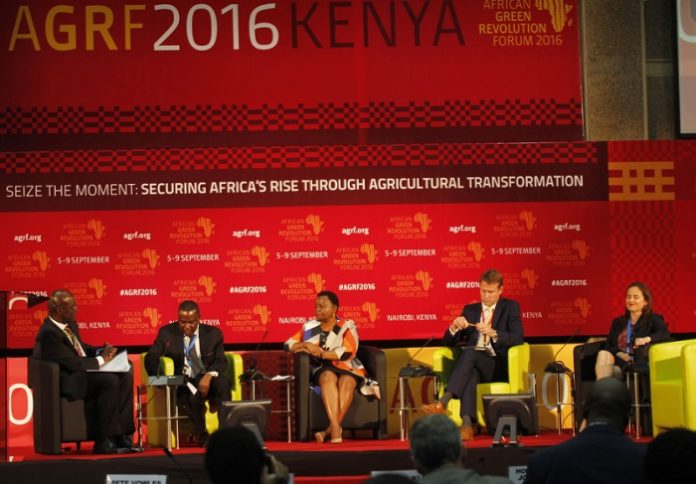
Weiteithye Farmers Group in Mwala, Eastern Kenya, comprises about 100 small-scale farmers struggling with crop production, value addition and marketing of their produce.
Like other smallholder farmers in Africa, the Weiteithye group lacks access to inputs, financial services and skills in agri-business, efficient machinery for processing produce, market information, new technology, among others. David Mutiso, the group’s Chairman, is calling for support to promote agriculture into a profitable sector. “Most of the people in the rural areas like us depend on farming. The Government must make agriculture work for us; we need to earn proper income from agriculture,” he said.
It is farmers like Mutiso who are set to benefit from the US $30 billion pledged by major development institutions, the private sector and African leaders at the African Green Revolution Forum (AGRF) in Nairobi, Kenya.
The funds will support investments to increase production and income for smallholder farmers and local African agriculture businesses over the next decade. A session on “Making Political, Policy and Financial Commitments to Africa’s Agricultural Transformation” saw Kenya’s President, Uhuru Kenyatta, pledge US $200 million to support 150,000 young farmers and agricultural entrepreneurs to access markets, finance and insurance over the next five years.
The African Development Bank announced investments of US $24 billion in the coming decade to drive Africa’sagricultural transformation. “This is a 400% increase in financing to the agricultural sector by the Bank from its current levels of $600 million per year,” Chiji Ojukwu, Director of the Bank’s Agriculture and Agro-industries Department, remarked on behalf of Bank President Akinwumi Adesina.
The Bank’s contribution will support the private sector to unlock the potential of African agriculture. In his keynote address delivered on September 8, 2016 during a plenary session on the “Role of Policy in Enabling Public-Private Partnerships to Achieve African Agricultural Transformation”, President Adesina said, “Africa must seize this moment and prioritize investments in agriculture. It is time to support African farmers; African farmers cannot fail.”
The Africa Agriculture Status Report 2016, launched at the AGRF, highlights the importance of private-sector investment in all aspects of agriculture, such as inputs, as well as the agricultural value chain, including production, processing, marketing and transport.
A fertilizer firm, OCP Africa, committed to investing US $150 million over the next five years to support local fertilizer distribution, storage and blending, while the World Food Programme promised to purchase at least US$120 million each year in agricultural products from smallholder farmers through a partnership called the Patient Procurement Platform.
The Bill and Melinda Gates Foundation, for its part, pledged US $5 billion, a portion of which will go towards crop and livestock research, strengthening data, and improving systems to deliver innovation and information; and to provide better tools to farmers. The next six years will see Africa’s agriculture benefit from US $3 billionpledged by the International Fund for Agricultural Development.
The Rockefeller Foundation committed to contributing US $180 million towards investments in human resilience to catalyse agricultural transformation, while the Kenya Commerical Bank, East Africa’s largest commercial Bank will invest US $350 million in loans for smallholder farmers, 50,000 of them women and another 50,000 youth.
Targeting women and youth is priority for the AfDB. Through its Affirmative Finance Action for Women (AFAWA), the Bank will help to leverage US $3 billion for women farmers and entrepreneurs. The Bank is already rolling out its ENABLE (Empowering Novel Agri-Business Led Employment) Youth initiative, in partnership with the International Institute of Tropical Agriculture.
The ENABLE Youth program seeks to bolster youth entrepreneurship in agriculture and agri-business. The initiative will see the Bank train the next generation of agriculture entrepreneurs, also referred to as ‘agri-preneurs’, in several countries, and provide them with seed money through banks to finance their bankable business plans.
SOURCE African Development Bank (AfDB)

